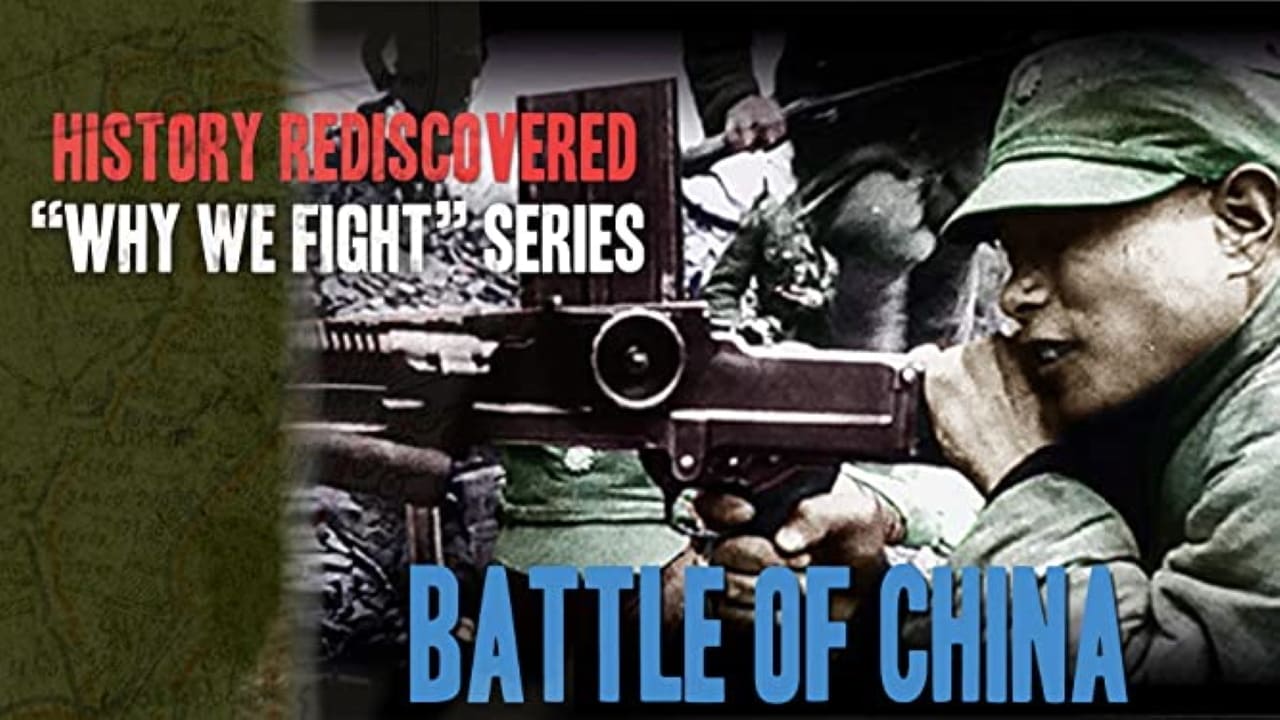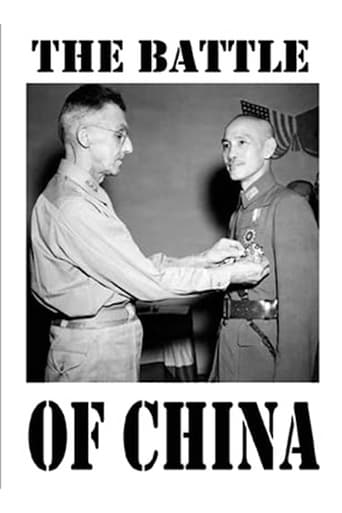


Am i the only one who thinks........Average?
... View MoreIt's fun, it's light, [but] it has a hard time when its tries to get heavy.
... View MoreJust intense enough to provide a much-needed diversion, just lightweight enough to make you forget about it soon after it’s over. It’s not exactly “good,” per se, but it does what it sets out to do in terms of putting us on edge, which makes it … successful?
... View MoreClose shines in drama with strong language, adult themes.
... View MoreThis is direct text book documentary propaganda. You could base a documentary class around this.It is Capra's World War II documentary about China's turmoil with Japan.Obviously, we were at war with Japan, and allied with China.Even today, it could fool some people, but most people have seen just how horrific those "marches" were.Back to back with Russia, China is shown in the film to strategically move everything Westward, away from Japan. Back to back with Russia, they could use industry, relatively safe with their ally, against Japan, because Russia had to do the same with Germany.The mass migration, the mass deployments, the mass use of labor, all are shown in true propaganda form as being strategic and heroic. Incredibly, these same images are used today to show immense brutality and inhumanity, as we value human life much more today.In the forties, patriotism and Nationalism were prize feelings, for better or worse.
... View MoreThere has been a political documentary, of recent vintage, called Why We Fight, which tries to examine the infamous Military Industrial Complex and its grip on this nation. It is considered both polemical and incisive in making its case against both that complex and the war fiasco we are currently involved in in Iraq. Yet, a far more famous series of films, with the same name, was made during World War Two, by Hollywood director Frank Capra. Although considered documentaries, and having won Oscars in that category, this series of seven films is really and truly mere agitprop, more in the vein of Leni Reifenstal's Triumph Of The Will, scenes of which Capra recycles for his own purposes. That said, that fact does not mean it does not have vital information that subsequent generations of World War Two documentaries (such as the BBC's lauded The World At War) lacked, nor does that mean that its value as a primary source is any the less valuable. They are skillfully made, and after recently purchasing some used DVDs at a discount store, I found myself with the opportunity to select a free DVD with my purchase. I chose Goodtimes DVD's four DVD collection of the series.Rarely has something free been so worth invaluable. While there are no extras on the DVDs, and the sound quality of the prints varies, these films provide insight into the minds of Americans two thirds of a century ago, when racism was overt (as in many of the classic Warner Brothers pro-war cartoons of the era), and there was nothing wrong with blatant distortion of facts. The seven films, produced between 1942 and 1945, are Prelude To War, The Nazis Strike, Divide And Conquer, The Battle Of Britain, The Battle Of Russia, The Battle Of China, and War Comes To America.Overall, the film series is well worth watching, not only for the obvious reasons, but for the subtle things it reveals, such as the use of the plural for terms like X millions when referring to dollars, rather than the modern singular, or the most overused graphic in the whole series- a Japanese sword piercing the center of Manchuria. Yet, it also shows the complexities of trying to apply past standards to current wars. The lesson of World War One (avoid foreign entanglements) was not applicable to World War Two, whose own lesson (act early against dictatorships) has not been applicable in the three major wars America has fought since: Korea, Vietnam, nor Iraq. The fact that much of this series teeters on the uncertainties of the times it was made in only underscores its historic value in today's information-clogged times. It may not help you sort out the truth from the lies and propaganda of today, but at least you'll realize you are not the first to be in such a tenuous position, nor will you be the last.
... View MorePart 6 in a series of 7 films created as a briefing for soldiers but also released for public viewing, these films by Frank Capra for the War Department are simultaneously good propaganda and good history, well told. Footage is from the field, and the historical facts behind the narration are largely accurate and informative, if "embellished". The embellishment is what makes it propaganda, yet it does not diminish the facts presented. I'm very impressed that an informed and largely accurate reading of history could be presented in a way that makes an emotional and moral point about the justness of fighting fascism, deliberate mass murder of civilians and tyranny. (And no, that fight does not justify later bombings of Dresden or Hiroshima and Nagasaki.)Effective and well done, this is influential film-making during a time of chaos, confusion and disarray. In hindsight we can see that things turned out well for our side, yet at the time these films were made victory against world fascism was definitely not a certainty. These films helped to lay a moral foundation for the open-ended challenges faced then. They also provided a historical context and education about world events leading up to American involvement in the war that most soldiers probably did not possess. Pearl Harbor was correctly presented as a midpoint in Japan's war of aggression, not the beginning of it. This film was a "morning wake up" historical briefing for the sleeping giant's fighters.
... View MoreThis, like the other films in the series, is a propaganda film. That being said, it is a very good documentary. This is due to three reasons. 1)Capra was a very good director 2)It is truthful - the information is not skewed by the film's agenda and 3)the battle footage speaks for itself. The narration is a bit overdramatic, but that is typical I think of movies in this era. I enjoyed this and will definitely watch the other films in the series.
... View More